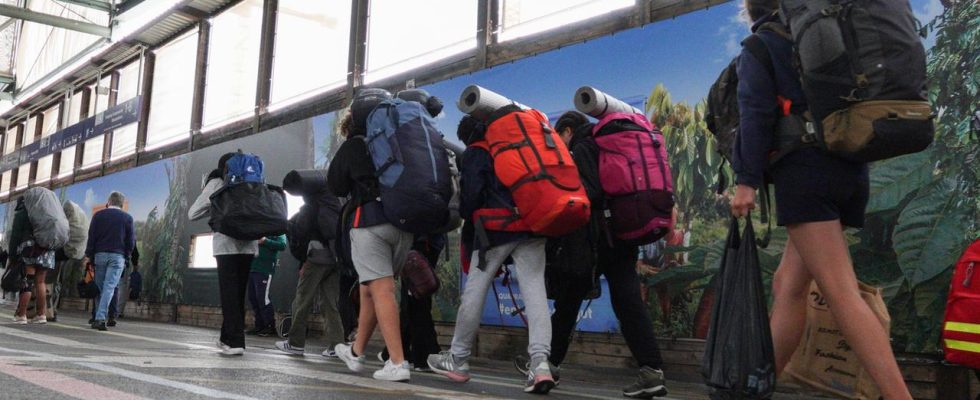Railway, politics and passenger associations agree: the Deutschlandticket is a success. However, more passengers also mean fuller trains. And the railway infrastructure hardly allows for further growth.
For Deutsche Bahn, press events on the subject of the “Deutschlandticket” are currently a welcome change. Finally, it’s not about delayed and canceled trains or blocked routes due to construction sites.
Instead, the train makes positive headlines thanks to the Germany ticket decreed by politicians. Since May, subscribers have been able to use regional transport throughout Germany for EUR 49. And the number of those who do so is growing. A railway spokesman says: “The Deutschlandticket is a real success. In June, a quarter more travelers took DB trains than in April. They also traveled longer distances with DB.”
This is also confirmed by a study by the mobile operator O2 Telefónica. The result of an analysis of anonymised movement data shows that more people have recently taken the train. In the Berlin-Brandenburg area, for example, there was a full increase of 22.1 percent more train journeys on working days in May and June than in April – when the Germany ticket did not yet exist. As a result, many people now use the train, especially for daily commuting.
Hardly any traction for drivers
The idea behind the ticket is simple: to make train travel so cheap that the price also attracts convinced drivers to the trains. This seems to have only been partially successful, as various statistics show. It is difficult to record how intensively subscribers use their ticket – in contrast to customers who buy single tickets. And so there are different numbers from numerous local and regional transport companies. But they all point to one thing: Only relatively few people do without driving because of the Deutschlandticket.
Detlef Neuss, national chairman of the Pro Bahn passenger association, says: “Customers who have really switched from cars to local transport make up between three and eight percent of new customers. That’s not that much, you have to say that very clearly. The people don’t flock from cars to trains in droves.”
More excursions, more commuting
But there is apparently also growth in private travel. “Excursion traffic on the weekends in particular has increased. We are seeing a significant increase on classic excursion connections,” says a railway spokesman.
Despite all the imponderables, the figures show that the Deutschlandticket is well received. Even if Pro-Bahn chairman Neuss suspects that people who have previously traveled by train are particularly happy about the 49-euro subscription: “Existing customers have the greatest advantage. It has become significantly cheaper for them .”
More passengers, but not more trains
At the same time, the increase in passengers due to the Germany ticket also increases the problems of the railways. For years, rail managers have openly admitted that the company is operating at the limit. More trains simply could not be sent into the almost fully utilized rail network. And the infrastructure is so dilapidated that many routes will have to be completely renovated by 2030.
The fuller trains and the resulting demands for shorter intervals, more trains and more reliable timetables hit the railways at the wrong time. By the end of the decade, the group is actually busy with itself.
“Germany offer” for Germany ticket?
The fact that the Deutschlandticket is successful, but not in such a way that the masses flock to the trains, fits in well with the difficult situation of the railways. “If the number of passengers had doubled, that would be a real problem,” says Pro-Bahn chairman Neuss. “The train is not getting that shouldered at the moment.”
The railway explains that the three months since the introduction are not yet sufficient for an accurate picture. It is not yet known on which routes permanent relief would have to be created. “We drive the offer ordered by the federal states,” says a railway spokesman. “Together with the federal states, we are observing how the number of passengers is developing in order to develop joint solutions if necessary. We have to adjust the offer on particularly popular routes, i.e. create a Germany offer for the Deutschlandticket.”
Soon 59-euro ticket?
In addition, the long-term financing of the offer is not secured. So far there have only been commitments until the end of the year. Pro-Bahn chairman Neuss says the three billion euros from the federal and state governments are money well spent. Finally, they noticeably improved the attractiveness of rail transport.
But he also says: “We are demanding that the financing be secured beyond 2024. But we are also aware that at some point it will have to be raised to 59 or 69 euros.”

